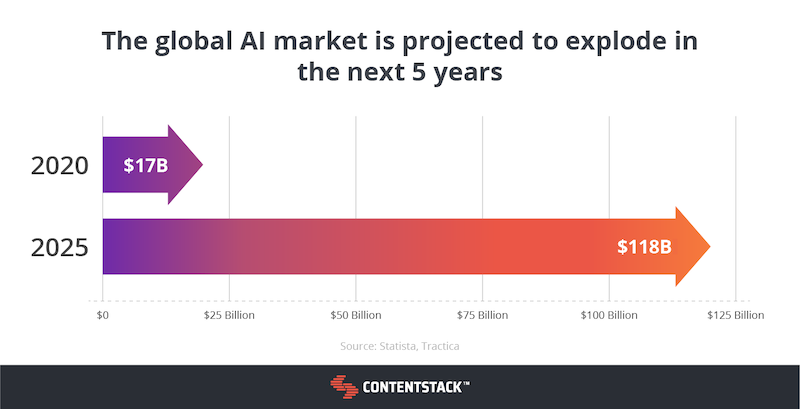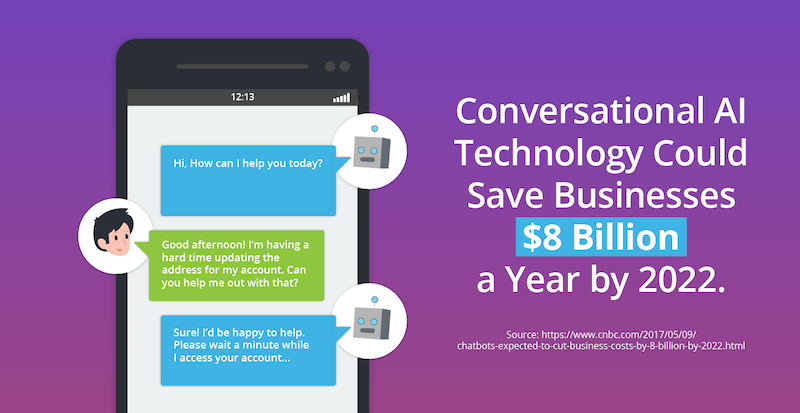
Artificial intelligence (AI) is nothing new. It has been taking over headlines and technology conferences since before Google’s AlphaGo taught itself to play — and win at — chess in less than four hours. However, many people don’t realize that AI doesn’t only exist in headlines and conferences anymore. It’s already a part of our everyday lives. It’s working behind the scenes in our cars, our search engines, and our in-home voice-activated smart speakers. AI is not some futuristic technology we can only imagine; it is here today and has found its way into nearly every aspect of our personal and professional lives, including the customer experience.
What is AI?
AI-enabled machines are capable of mimicking human cognitive activities. “AI” is a term that covers various technologies like machine learning, natural language processing, and natural language generation. There are two main types of AI: weak AI and strong AI.
Weak AI simulates human behavior by automating time-consuming tasks and by analyzing data. Another term for weak AI is “narrow AI” since it focuses on one narrow task. When you ask Alexa to turn on the lights, that’s an example of weak AI. Strong AI makes cognitive, independent decisions that are not programmatic, but instead are the result of a reasoned analysis.
Machine Learning (ML) is when a program has access to data, and it applies algorithms that can learn from past experience or historical data. One of the most common uses of machine learning is image recognition, such as Google Image Recognition.
Natural Language Processing (NLP) uses machine learning to attain meaning from human languages. Some examples of NLP applications include Grammarly, Google Translate, spam filters, and social media monitoring tools such as Hootsuite or Buffer.
Natural Language Generation (NLG) produces content from structured data. Gmail’s Smart Compose that suggests text when you are writing an email is an example of NLG. The Associated Press uses Automated Insights’ Wordsmith, an NLG application, to transform data into readable content, such as quarterly earnings and sporting reports.
AI-powered marketing technology aggregates and analyzes data from different sources to make real-time decisions about which experience works best for a specific customer on a particular channel. And current growth trends indicate that AI technology is only going to increase in popularity over the next five years.

AI Trends Shaping Customer Experience in 2020
As our world becomes increasingly reliant on digital experiences, companies are recognizing how critical the customer experience (CX) is to differentiate themselves from their competitors. And as AI continues to evolve, it will play a vital role in creating an exceptional digital customer experience. Let’s look at several trends shaping the customer experience in the coming years.
AI-Collected Data Increases Personalization
As consumers, we have become used to personalized content. As you scroll your Facebook feed, for example, you might see an ad for an item your housemate mentioned last week. No, brands aren’t listening in on your conversations in a traditional sense; but platforms are collecting what you, your housemates, your kids, and even your colleagues search for and applying AI to it to deliver more personalized ads.
And there’s a good reason for this. Personalized content increases engagement drastically. The vast majority of consumers say they are more likely to make a purchase due to personalized ads.

In addition to personalized ads, companies are also turning to AI to develop dynamic content that adjusts ad copy and even blog content to personal data it gathers about users. AI is increasingly able to gather content and understand data about what topics, content, and ads appeal to consumers, which drastically increases a brands’ ability to personalize content.
AI Expertise Will be Critical
As new tools and software begin to democratize access to powerful AI computing, there is likely to be an increased need for skilled staff who understand how to maximize AI technology. Companies will need to move from focusing efforts on simple problems, such as suggesting related products to an online shopper, to a sophisticated analysis of data on a macro and a micro-level. This shift to solving deeper problems is transforming the customer experience.
In many cases, companies will need to hire staff with AI expertise and empower their workforces to learn and experiment with this technology to build unique systems that deliver the type of customer experience users expect.
Conversational AI is Going to Play a Key Role
Conversational AI allows users to “speak” (or chat) with AI programs to receive a customized customer experience. It provides seamless accessibility and can enhance the overall customer experience by providing customers with different ways to shop and acquire services from a broader range of companies.
Once implemented, conversational AI can save businesses across sectors thousands of dollars, all while improving the customer experience and providing services to a higher number of customers or prospects. Analysis firm Juniper Research estimates that conversational AI technology could reduce business costs by close to eight billion dollars a year by 2022.

As conversational AI technology evolves, it is enabling humans to have a natural dialogue with computers, and it will begin to understand how humans feel and when to hand off the communication to another human.
Regulations and Security Will Need to Catch Up
Recently, news broke that Amazon had live personnel listening to audio clips from Echo devices to help the AI assistant better understand and respond to commands. For many people, this felt like a severe invasion of privacy, as many consumers did not know their recordings could be used for training purposes.
As AI technology advances, similar security issues will continue to arise. Companies will need to be transparent about data collection, storage, security issues, and how they use that data. Federal and international laws and regulations are sure to evolve to address new security issues as they emerge.
How AI Tech Can Help Companies Improve CX
In an ever-competitive environment, companies must commit to engaging with their customers and making them feel valued. AI is already assisting many companies in reaching that goal by reducing complaint resolution time, decreasing customer service agents’ workloads, and providing personalized content.
However, the AI industry is rapidly evolving, and it can be hard to keep up with the constant changes. Here are four ways AI can help companies improve the customer experience in the coming years.
Providing Customers With 24/7 Support
Unlike humans, AI never sleeps. AI allows customers to access customer support 24/7 — something most companies would not be able to afford to staff with humans. What’s more, AI-powered 24/7 customer support isn’t just about “good CX” — it can also level the playing field in today’s competitive market. Most customers are not willing to wait until Monday at 9 a.m. to get answers to their most pressing questions.
Using AI, companies can provide exceptional support at any time at a far lower cost, and that can drive revenue. According to a Bain & Company study, businesses that provide a better customer experience may generate as much as 8% more revenue than their competitors.

Streamline the Customer Experience by Empowering Self-Service
Many of us already use AI to turn on our lights, adjust our thermostat, or add items to our shopping lists. But as AI technology evolves, more companies are incorporating AI to allow customers to complete a broader range of tasks. For example, banks are allowing customers to make transfers, complete payments, and even resolve issues with lost or stolen cards, all via Alexa and Google Home devices. In the future, AI may allow customers to complete a more extensive range of tasks related to the customer experience, including making purchases, getting support, and paying bills.
Support the Omnichannel Experience
The customer journey no longer begins and ends on a single device. For example, a user might pull up a comparison post about lawn mowers on their smartphone while riding the train home from work. After dinner, they open their tablet from the couch to continue their search, then fire up their laptop to make the final purchase.
Companies need to be able to follow consumers from one device to another, which represents two challenges. Connecting all that data can be challenging, if not impossible, without advanced technology. Additionally, companies need a way to streamline the delivery of personalized content across all these devices.
AI-powered data unification tools, which follow customers across platforms, make this task relatively pain-free. A headless CMS, like Contentstack, makes it easier to manage cross-device content by simplifying content management and allowing companies to deliver a streamlined customer experience on mobile, tablet, desktop, and voice-activated devices.
Improve Chatbots and AI-Powered VAs
Conversational AI technology makes it possible for humans to have a natural dialogue with computers, but the first efforts were stilted, unnatural, and not very useful. As AI continues to evolve, chatbots and AI-powered voice assistants (VAs) are becoming far more helpful to consumers.
Chatbots and voice-activated assistants are learning how to understand better what consumers need, ask clarifying questions, and then take actions based on your intent, rather than just your literal words. Companies will be able to use these devices to provide better customer service, make orders, and search for relevant information in the databases.
Maximize Your AI-Powered Customer Experience in 2020 and Beyond
Customers have more options than ever when deciding where to spend their money. Companies looking to compete by providing exceptional customer experiences can’t afford to ignore the current and future implications of AI, including its ability to provide better personalization, more effective lead generation, and conversion optimization.
Are you getting the most out of AI? Download our in-depth report Applying AI to Web Content Management and Digital Experience Platforms and learn how to stay ahead of your competition.




